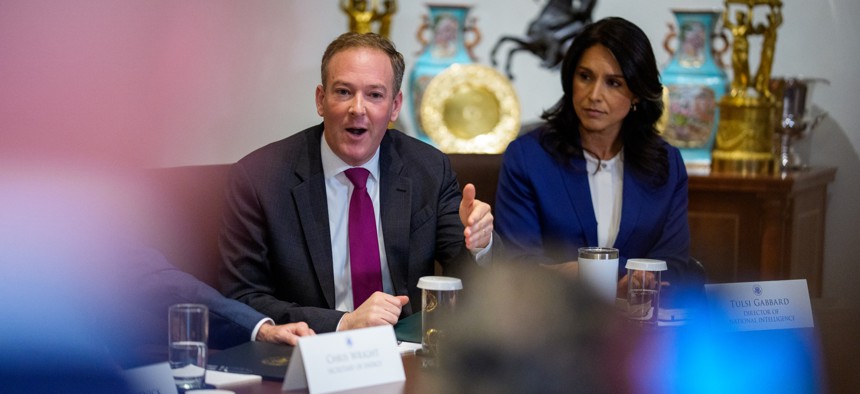
EPA Administrator Lee Zeldin, left, speaks during a cabinet meeting with President Trump at the White House on July 8, 2025. Andrew Harnik/Getty Images
Union calls for reinstatement of EPA workers suspended over letter
More than 130 EPA workers were put on administrative leave over their signature of a letter that criticized Administrator Lee Zeldin’s direction for the agency.
The union that represents workers at the Environmental Protection Agency this week called on Administrator Lee Zeldin to reinstate the nearly 140 employees who were put on leave last week in retaliation for signing a letter critical of the agency’s new direction under the Trump administration.
Last month, nearly 300 EPA employees sent an open letter to Zeldin entitled "Declaration of Dissent", accused the Trump administration of “recklessly undermining” EPA’s mission for ignoring science, abandoning environmental justice efforts and promoting a “culture of fear” within the agency. More than 100 of the initial signatories endorsed the letter anonymously, a number that has since grown to more than 600 as of Friday afternoon.
“Administrator Zeldin, you have done your best to ensure that employees have no recourse against these assaults by nullifying bargaining agreements and refusing to negotiate,” they wrote. “In addition, you administration has fired or forced onto administrative leave several categories of employees, including those responsible for environmental justice and those managing diversity, equity, inclusion and accessibility initiatives.”
Last week, Zeldin placed 139 of the roughly 170 named signatories on administrative leave—labor officials were exempt, while others were already on leave, according to CNN—until at least next week pending an investigation into their conduct. Though the letter stipulates that none of the employees who signed the letter did so in their official capacity, during work hours or using agency resources, an EPA spokesperson claimed that the letter amounted to “sabotaging” the agency.
“The Environmental Protection Agency has a zero-tolerance policy for career bureaucrats undermining, sabotaging and undercutting the administration’s agenda as voted for by the great people of this country last November,” they said.
In a letter to Zeldin Thursday, Justin Chen, president of the American Federation of Government Employees Council 238, which represents EPA workers, accused Zeldin of violating employees’ First Amendment rights by retaliating against them for protected speech and called for their immediate reinstatement.
“The agency’s decision to place these employees on administrative leave and to threaten further employment actions is a blatant act of retaliation,” Chen wrote. “These employees engaged in protected speech on a matter of significant public concern, and their actions are fully protected by federal law and our collective bargaining agreement. We will not stand idly by while our members are unjustly targeted.”
Stephanie Rapp-Tully, a partner at Tully Rinckey PLLC and an federal employment attorney, said since the placement of someone on paid leave does not rise to the level of an adverse personnel action, the employees have little recourse until they are either reinstated or subjected to discipline or removal.
Much of what happens next could come down “fact-specific” issues, such as the nature of someone’s position or whether the agency can prove some employees signed the letter during work or using agency resources. Rapp-Tully said as a general matter, while an argument could be made in favor of meting out discipline, it would be an unusual escalation—similar letter from National institutes of Health workers to NIH Director Jay Bhattacharya produced no such response.
“[The letter does seem to be relatively work-related, and it is talking about work—I think that would be an interesting thing to read if that’s the avenue that EPA takes,” she said. “The mere idea that an employee is disciplined for disagreeing with a policy or with a management decision—I don’t see anything here that would be against any rule or regulation that would warrant discipline.”
How are these changes affecting you? Share your experience with us:
Erich Wagner: ewagner@govexec.com; Signal: ewagner.47
NEXT STORY: Third postal union ratifies new labor contract







